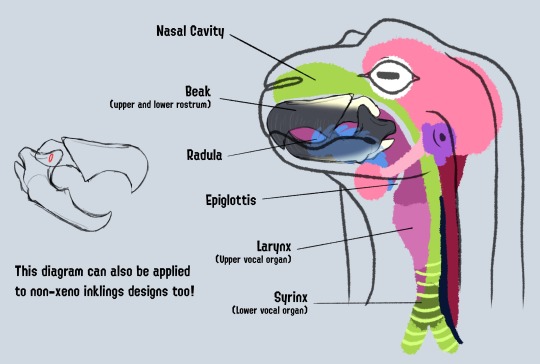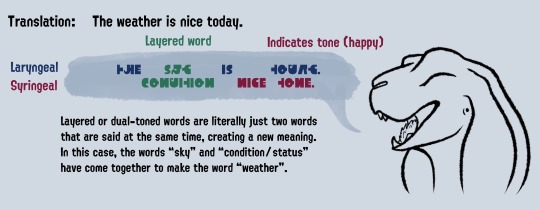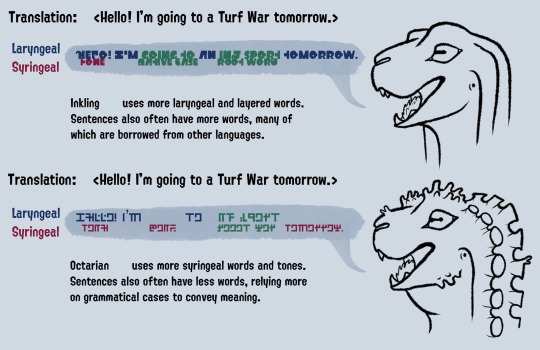#I should go outside instead of analysing the silly squid game
Explore tagged Tumblr posts
Text
HI HELLO! Welcome to my completely unnecessarily detailed analysis on how I think Inkfish languages could work! + with art! yay! This is all pretty rough and not fully fleshed out (I don't have the time or patience for that lmao). THIS IS A LONG POST.
Okay, so there's dozens of languages spoken by cephalopods in the Mollusc Era but the main two I'll talk about are Inkling (or Inklish) and Octarian, spoken mostly by Inklings and Octolings respectively.

In cephalopods, speech is formed using the syrinx and larynx, two fancy vocal organs that most other species don't have together. The larynx makes sounds using the radula (tongue) and vocal folds in the throat, it's clear and pretty easy to understand as the sound itself resembles human speech, albeit warbled. The syrinx makes noise by vibrating air at the base of the trachea, it's often trickier to follow as it can sound more like droning background noise than words sometimes.
An inkfish can use both of them at once, resulting in an EXTREMELY complicated language system where words can be made up of multiple layered syllables, and several words and sentences can even be said at the same time.
As you can probably imagine, all of this is LITERAL HELL to learn for species who don’t have both a syrinx and a larynx (so basically anyone who isn't a cephalopod). But fear not! There are many simple and more inclusive alternatives, dialects and other cool stuff like sign language and instant TTS technology for people who physically can't pronounce Inkling/Octarian or even vocalise at all (eg. jellyfish).

Both main Inkfish languages can be broken down into laryngeal words (made with the larynx), syringeal/drone words (made with the syrinx) or a combination of both, called dual-toned/layered words.
Keep in mind that both word-types can be spoken at the same time. Layering can be used to add additional connotations to a word, or to even make a new one entirely. For example, the laryngeal noun ‘bird’ combined with the syringeal noun ‘metal’ spoken together will create the layered Inkling word ‘aeroplane’, like a compound word in English.

Dual-toned stuff is more common in Inkling than in Octarian, as the language is older and has more loanwords. Inklish's dependence on the larynx gives it a higher-pitched, clearer sound whereas Octarian's more monotone syrinx-based structure results in a deep, almost guttural sound.
Both cephalopod languages are heavy on tone and pronunciation, resulting in a plenty of accent indicators in written scripts. I used the in-game fonts for the art but if I were to rework it, each letter would probably be more complicated than traditional Mandarin on steroids. So hell on earth, basically.
On a side note, all of these language features open possibilities for some very cool poetry and literature. An inkfish author could write a poem with two lines of thought occurring at once, or a book with vivid emotional undertones written inside the prose. Pretty cool.
OKAY that's all I have to say thank you for reading! Hopefully this makes sense, feel free to send asks or whatever if it's confusing and I'll do my best to explain it better!
#I should go outside instead of analysing the silly squid game#I tried my best with my scientific and (limited) linguistic knowledge don't yell at me if I get something wrong lmao#my art#splatoon#xeno tag#xeno inkling#xeno octoling#splatoon 3#splatoon art#speculative biology#speculative zoology#conlang#splatoon headcanon#inkling#octoling#splatoon theory
604 notes
·
View notes